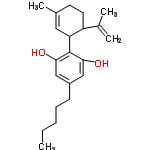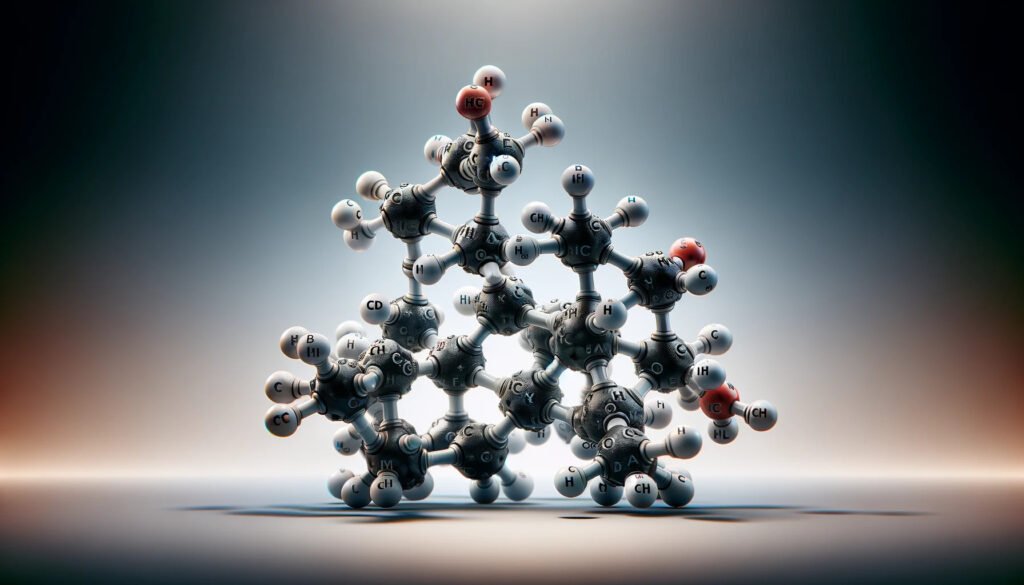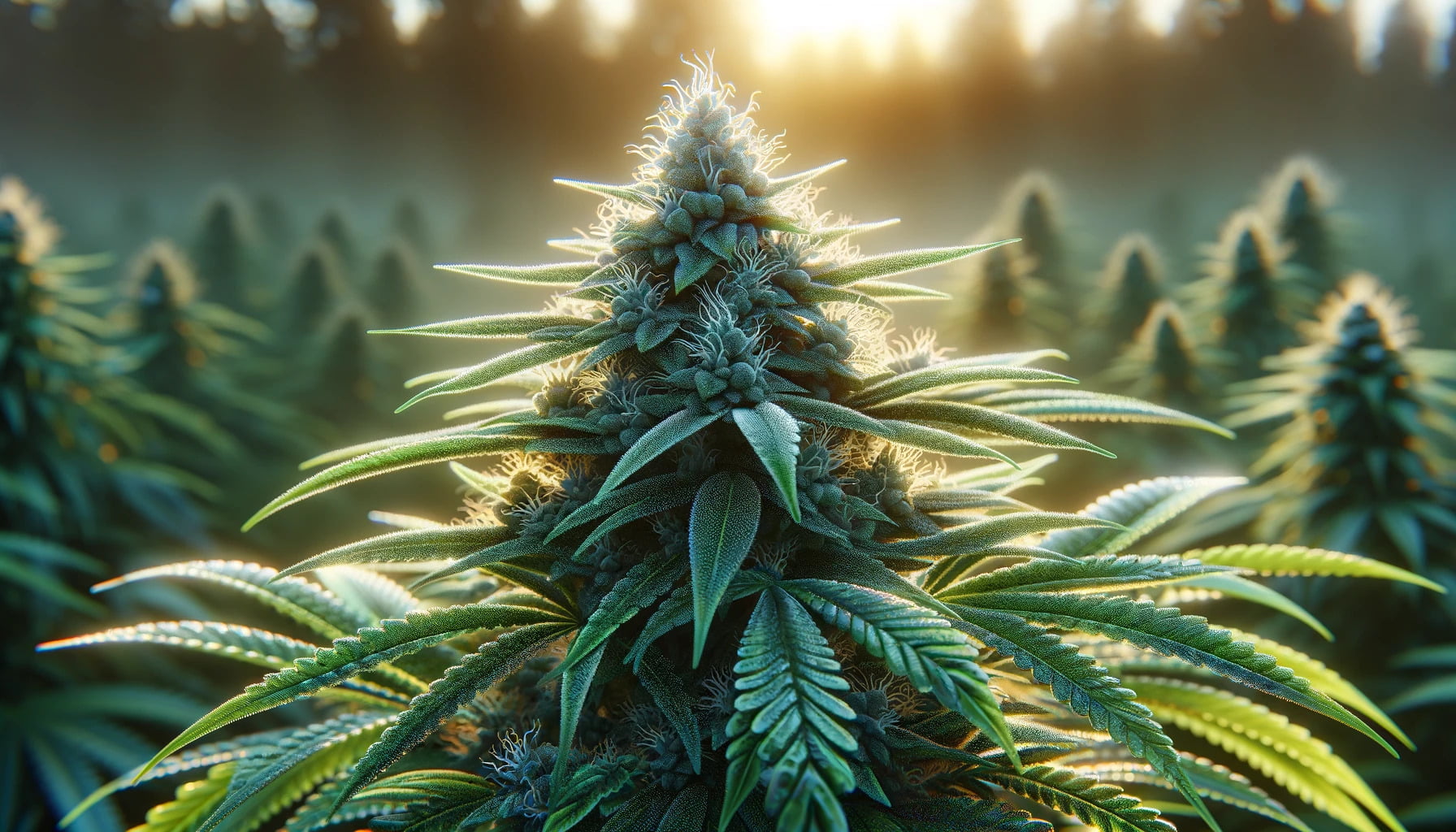
Cannabidiol (CBD) is a non-psychoactive phytocannabinoid derived from the hemp plant (Cannabis sativa).
As a natural compound, CBD interacts with the body’s endocannabinoid system to support brain health, alleviate anxiety and depression symptoms, improve sleep quality, and aid in neuroprotection.
This article explores the science behind cannabidiol, its potential as a nootropic for cognitive enhancement, different product types, dosage recommendations, and important considerations when choosing quality CBD products.
Table of Contents
What is Cannabidiol (CBD)?

CBD (chemically known as C21H30O2 or (2-[(1R,6R)-3-Methyl-6-prop-1-en-2-ylcyclohex-2-en-1-yl]-5-pentylbenzene-1,3-diol) is one of over 100 cannabinoid compounds found in the cannabis plant (Cannabis sativa L, Family Cannabaceae).
It’s derived primarily from hemp, a variety of Cannabis sativa that contains less than 0.3% THC (the psychoactive compound in marijuana). Unlike THC, CBD does not produce intoxicating effects and it’s not addictive.
These qualities make cannabidiol a safe and appealing option for those seeking the therapeutic potential of hemp.
How Does CBD Differ from THC?
While both CBD and THC (tetrahydrocannabinol) are cannabinoids, they have distinct effects on the body and brain:
- CBD is non-psychoactive, meaning it does not produce the cerebral and physical effects associated with medical cannabis use. THC, on the other hand, is the primary psychoactive compound in marijuana.
- CBD has been shown to counteract some of the negative effects of THC, such as anxiety and paranoia.
- CBD and THC have distinct molecular structures.

What are the Potential Benefits of CBD for Cognitive Enhancement?
CBD has shown promise in supporting cognitive function through various mechanisms:
- Reduces inflammation: CBD’s anti-inflammatory properties may help protect the brain from damage and age-related cognitive decline.
- Promotes neurogenesis: Studies suggest that CBD may stimulate the growth of new brain cells, particularly in the hippocampus, a region critical for memory and learning.
- Modulates neurotransmitters: CBD interacts with serotonin, dopamine, and GABA receptors, which play crucial roles in mood, focus, and mental clarity.
Let’s take a closer look at the potential mental boost that CBD can provide!
How Does CBD Help with Pain Relief?
CBD has analgesic properties that can help alleviate various types of pain:
- Reduces inflammation: CBD inhibits pro-inflammatory cytokines and enzymes, reducing pain and swelling.
- Interacts with pain receptors: CBD modulates TRPV1 receptors, which are involved in pain perception.
- Enhances endocannabinoid signaling: CBD inhibits the breakdown of anandamide, an endogenous cannabinoid that regulates pain.
How Does CBD Reduce Anxiety and Depression?
CBD has shown anxiolytic and antidepressant effects in both human and animal studies:
- Modulates serotonin signaling: CBD enhances 5-HT1A receptor activation, which is involved in mood regulation.(1)
- Reduces limbic activity: CBD attenuates blood flow to the amygdala and anterior cingulate cortex, brain regions associated with anxiety and fear processing.
- Promotes neuroplasticity: CBD stimulates BDNF (brain-derived neurotrophic factor) expression, supporting the growth and survival of neurons in mood-related brain areas.
How Does CBD Improve Sleep Quality?
CBD may help improve sleep by addressing underlying causes of sleep disturbances:
- Reduces anxiety: By calming the mind and body, CBD can make it easier to fall and stay asleep.(2)
- Alleviates pain: CBD’s analgesic effects can minimize pain-related sleep disruptions.
- Regulates sleep-wake cycle: CBD interacts with receptors involved in circadian rhythm regulation, potentially improving sleep-wake patterns.
How Can CBD Alleviate Symptoms of Epilepsy?
CBD has demonstrated anticonvulsant properties and is an FDA-approved treatment for certain forms of epilepsy:
- Reduces seizure frequency: In clinical trials, CBD reduced seizure frequency by 41.2% in patients with Dravet syndrome and Lennox-Gastaut syndrome.(3)
- Modulates neuronal excitability: CBD regulates calcium ion channels and GABA receptors, which play a role in controlling neuronal excitability and seizure threshold.(4)
How Does CBD Aid in Neuroprotection and Neurogenesis?
CBD’s neuroprotective and anti-inflammatory properties may support overall brain health:
- Promotes neurogenesis: CBD stimulates the proliferation and differentiation of neural stem cells into new neurons, particularly in the hippocampus.(5)
- Reduces neuroinflammation: CBD inhibits glial cell activation and pro-inflammatory cytokine release, which are associated with neurodegenerative diseases.
- Protects against excitotoxicity: CBD reduces glutamate-induced excitotoxicity, which can lead to neuronal damage and death.
- Enhances mitochondrial function: CBD improves mitochondrial efficiency and reduces oxidative stress, supporting neuronal survival.(6)
- Improves cerebral blood flow: CBD may enhance blood flow to the hippocampus and prefrontal cortex, supporting memory and executive function.
How Does CBD Work in the Body and Brain?
CBD interacts with various receptors and signaling pathways in the body and brain:
| Area in the Brain & Body | Mechanism |
|---|---|
| Endocannabinoid system | CBD modulates CB1 and CB2 receptors, which regulate neurotransmitter release, inflammation, and pain perception |
| Serotonin receptors | CBD activates 5-HT1A receptors, which are involved in mood, anxiety, and sleep regulation |
| TRPV1 receptors | CBD desensitizes TRPV1 receptors, which play a role in pain signaling and inflammation |
| PPAR receptors | CBD activates PPAR-γ receptors, which have anti-inflammatory and neuroprotective effects |
What is the Endocannabinoid System?
The endocannabinoid system (ECS) is a complex cell-signaling system that regulates various physiological processes, including mood, pain, appetite, and immune function.(7)
It consists of endocannabinoids (self-produced cannabinoids), cannabinoid receptors (CB1 and CB2), and enzymes that synthesize and degrade endocannabinoids.

What are the Potential Side Effects of CBD?
While CBD is generally well-tolerated, some individuals may experience side effects, including:
- Dry mouth
- Diarrhea
- Reduced appetite
- Drowsiness
- Fatigue
Who Should Avoid Using Cannabidiol?
Certain individuals should exercise caution or avoid using CBD:
- Pregnant and breastfeeding women: Due to limited safety data
- Individuals with liver disease: CBD may affect liver enzyme levels
- People with low blood pressure: CBD may cause a further drop in blood pressure
Are There Any Interactions Between CBD and Other Nootropics or Medications?
CBD may interact with several nootropics and medications:
- Caffeine: CBD may enhance the effects of caffeine, leading to increased alertness and potential jitteriness.
- L-theanine: CBD and L-theanine may have synergistic effects on reducing anxiety and promoting relaxation.
- Antidepressants: CBD may interact with certain antidepressants, such as SSRIs and tricyclic antidepressants, by affecting their metabolism or enhancing serotonergic effects.
- Anticonvulsants: CBD may increase the levels of certain anticonvulsant drugs, such as clobazam and topiramate.
Always consult a healthcare professional before adding CBD to your healthcare regimen.
A healthcare professional will help guide you and aid you inavoiding potential interactions and adverse effects.
What is the Legal Status of CBD in the United States?
The legal status of CBD in the United States depends on its source and the specific state laws:
- Hemp-derived CBD (containing less than 0.3% THC) is legal at the federal level under the 2018 Farm Bill.
- Marijuana-derived CBD is illegal under federal law but may be legal in states that have legalized medical or recreational marijuana.
- Some states have specific regulations regarding CBD, such as age restrictions or product testing requirements.
What are the State Laws Regarding CBD?
State laws regarding CBD vary widely:
- Some states, such as California and Colorado, have legalized both hemp-derived and marijuana-derived CBD.
- Other states, like Idaho and Nebraska, have more restrictive laws and may only allow CBD with 0% THC.
- Certain states require CBD products to be labeled with QR codes that provide information on the product’s origin, testing, and ingredients.
It’s essential to research the specific CBD laws in your state to ensure compliance.

How to Use CBD Products for Cognitive Enhancement?
When using CBD for cognitive enhancement, consider the following factors:
- Choose a high-quality, third-party tested product from a reputable source.
- Start with a low dose (5-10mg) and gradually increase until desired effects are achieved.
- Be consistent with dosing, as the benefits of CBD may take time to manifest.
- Combine CBD with other cognitive-enhancing strategies, such as exercise, meditation, and a healthy diet.
- Monitor your response and adjust the dosage or product as needed.
What are the Different Ways to Consume CBD?
BD can be consumed in various forms, each with its own onset and duration of effects:
| Method | Onset | Duration |
|---|---|---|
| Sublingual tinctures | 15-45 minutes | 4-6 hours |
| Oral capsules | 30-90 minutes | 6-8 hours |
| Edibles | 30-120 minutes | 6-8 hours |
| Vaping | 1-5 minutes | 2-4 hours |
| Topical application | Varies | Varies |
What is the Recommended Dosage of CBD for Cognitive Enhancement?
A general guideline is to start with a low dose (5-10 mg) and incrementally increase by 5-10 mg every 3-7 days until the desired effects are achieved.
Most people find a dose between 10-50 mg per day to be effective for cognitive support.
It’s important to note that higher doses of CBD may cause sedation and potentially impair cognitive function. Therefore, it’s crucial to find the minimum effective dose and do not exceed it.
What are the Different Types of CBD Products?
CBD products come in various forms, each with its own benefits and drawbacks:
- CBD Isolate: Pure CBD extracted from hemp, containing no other cannabinoids or plant compounds.
- Full-Spectrum CBD: Contains all naturally occurring compounds found in hemp, including trace amounts of THC (less than 0.3%).
- Broad-Spectrum CBD: Contains a range of cannabinoids and terpenes but is THC-free.
| Form | Pros | Cons |
|---|---|---|
| CBD Isolate | Purest form of CBD, THC-free | Lacks entourage effect |
| Full-Spectrum CBD | Entourage effect, whole-plant benefits | Contains trace amounts of THC |
| Broad-Spectrum CBD | Entourage effect without THC | More expensive than isolate |
How to Choose Quality CBD Products for Cognitive Enhancement?
When selecting a CBD product for cognitive enhancement, consider the following factors:
- Hemp source: Choose products made from organic, non-GMO, domestically grown hemp to ensure quality and minimize contaminants.
- Extraction method: CO2 extraction is considered the safest and most efficient method for producing high-quality CBD oil.
- Third-party testing: Look for products that have been independently tested by an ISO 17025-compliant lab to verify their potency and purity.
- Certificate of Analysis (COA): A COA should be readily available and provide information on the product’s cannabinoid profile, terpene content, and contaminant testing results.
- Brand reputation: Research the brand’s history, customer reviews, and industry reputation to ensure they are trustworthy and reliable.
What are Third-Party Lab Tests for CBD?
Third-party lab testing is an independent analysis of CBD products conducted by an unbiased, ISO 17025-compliant laboratory.
These tests verify the product’s cannabinoid profile, potency, and purity, ensuring that it is free from contaminants such as heavy metals, pesticides, and residual solvents.
Reputable CBD brands will make their third-party lab results readily available to consumers, usually through a QR code on the product packaging or on their website.
| Test | Purpose |
|---|---|
| Cannabinoid profile | Verifies the concentration of CBD, THC, and other cannabinoids |
| Terpene profile | Identifies the terpenes present and their concentrations |
| Heavy metals | Ensures the product is free from heavy metal contaminants |
| Pesticides | Confirms the absence of pesticide residues |
| Microbial contaminants | Tests for the presence of harmful bacteria, fungi, and mold |
| Residual solvents | Verifies that no residual solvents are present from the extraction process |
- Resstel, Leonardo B M et al. “5-HT1A receptors are involved in the cannabidiol-induced attenuation of behavioural and cardiovascular responses to acute restraint stress in rats.” British journal of pharmacology vol. 156,1 (2009): 181-8. doi:10.1111/j.1476-5381.2008.00046.x↩
- Kesner, Andrew J, and David M Lovinger. “Cannabinoids, Endocannabinoids and Sleep.” Frontiers in molecular neuroscience vol. 13 125. 22 Jul. 2020, doi:10.3389/fnmol.2020.00125↩
- Koo, Chung Mo et al. “Cannabidiol for Treating Lennox-Gastaut Syndrome and Dravet Syndrome in Korea.” Journal of Korean medical science vol. 35,50 e427. 28 Dec. 2020, doi:10.3346/jkms.2020.35.e427↩
- Martinez Naya, Nadia et al. “Molecular and Cellular Mechanisms of Action of Cannabidiol.” Molecules (Basel, Switzerland) vol. 28,16 5980. 9 Aug. 2023, doi:10.3390/molecules28165980↩
- Valeri, Andrea, and Emanuela Mazzon. “Cannabinoids and Neurogenesis: The Promised Solution for Neurodegeneration?.” Molecules (Basel, Switzerland) vol. 26,20 6313. 19 Oct. 2021, doi:10.3390/molecules26206313↩
- Atalay, Sinemyiz et al. “Antioxidative and Anti-Inflammatory Properties of Cannabidiol.” Antioxidants (Basel, Switzerland) vol. 9,1 21. 25 Dec. 2019, doi:10.3390/antiox9010021↩
- Finn, David P et al. “Cannabinoids, the endocannabinoid system, and pain: a review of preclinical studies.” Pain vol. 162,Suppl 1 (2021): S5-S25. doi:10.1097/j.pain.0000000000002268↩
